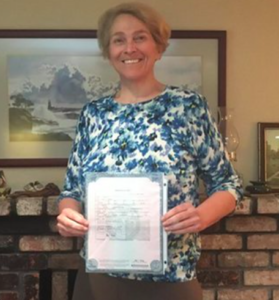Global Intersex Activists & The Guardian on Intersex Birth Certificates
Bravo to Sara Kelly Keenan and to The Guardian for this respectfully written and well researched article, featuring fantastic interviews with Keenan–the first U.S. citizen to be issued an “intersex” birth certificate (from New York City)–her husband, and others.
We have long spoken about the fact that in order for nonconsensual surgeries, aka Intersex Genital Mutilation (IGM) to end, intersex people must be recognized and acknowledged as equal citizens. We celebrated this recognition last November with the victorious ruling in our associate director Dana Zzyym’s lawsuit against the U.S. State Department for non-binary gender recognition on their passport. In December, Keenan received her intersex birth certificate, and we continue to celebrate both historic events this month! We realize that until intersex people are recognized and incorporated into mainstream society–not as people with medical conditions but as uniquely equal individuals–parents will continue to believe that they must change their babies in order to help them “fit in”.
“There’s nothing about intersex that needs to be shameful or hidden or surgically altered to fit into a gender binary world. This is just another way human beings are created.” — Sara Kelly Keenan

We note that Keenan and other intersex individuals are advocating–in alignment with the global intersex advocacy community–for gender recognition only for intersex adults who choose it. As our E.D. Hida Viloria told People magazine last week, “We commend Keenan and Zzyym, and note that until equal services and protections are available to all intersex citizens, this designation should remain a voluntary one only, for adults who seek it.”
This is a point well worth making given the existence of Germany’s third gender birth certificate law, passed in November 2014, which forces intersex babies to be registered with an “indeterminate” sex. While lauded at the time by the mainstream press as a victory for intersex people, it was opposed by many advocates around the world and all German speaking intersex activists–some of whom who had met with German government officials shortly before the law was passed and called for, not the new law, but a ban on nonconsensual infant surgeries/IGM. As our E.D. Hida Viloria wrote at the time, “…the current situation amounts to Germany forcibly creating a new class of citizens without equal rights or access to services and with no legal protection from the violence to their bodies that the law makes them more vulnerable to… Some claim [the ‘indeterminate’ registration] will help by giving parents more time to decide whether to label their baby male or female, but since the law states that babies with intersex bodies can not be labeled male or female, the only way for parents to attain those labels for their child will be through the use of “normalizing” genital surgeries.”
Germany’s birth certificate law says that babies who cannot be determined to be male or female cannot be legally registered as such, once again taking the power of self-determination from where it belongs: with intersex people. As a representative of OII-Europe noted in Viloria’s article at the time, “Who determines that a child ‘can be assigned to neither the female nor the male sex’? According to current practice: only medicine. The power to define what sex is and who is assigned to which gender remains intact with the new regulation.”
The global intersex human rights community agrees–as witnessed by the Malta Declaration, drafted at the 2013 Third International Intersex Forum, in Malta–that governments should, “register intersex children as females or males, with the awareness that, like all people, they may grow up to identify with a different sex or gender.” We do so because, as our E.D. and others have stated, it would be highly detrimental to intersex babies to register them as intersex before equal rights and protections are available to intersex citizens. However, we are aware that it is up to intersex adults to pave the way by attaining intersex acceptance and equality. Thus, the Malta Declaration also demands that intersex adults’ be given the right to self-determine our gender: “All adults and capable minors should be able to choose between female (F), male (M), non-binary or multiple options. In the future, as with race or religion, sex or gender should not be a category on birth certificates or identification documents for anybody.”
The Guardian article focuses on Keenan’s desire to bring recognition regarding the existence of intersex people in order to help end the human rights abuses we face, highlighting IGM: “Advocates argue that it’s unethical to force a gender assignment on intersex infants, particularly with genital mutilations that can severely impair sexual functioning, and that people should be able to make their own decisions about their bodies and identities when they are older.”
It also calls attention to issues which intersex adults face, regardless of whether of not we are subjected to IGM:
“Proper identification can also help people avoid a wide range of discriminatory practices. As is common with trans people, intersex and non-binary people can often struggle with police, airport security, doctors, employers, landlords and others misgendering them or refusing to acknowledge their identities.”
Keenan’s husband told The Guardian it’s been a joy to embrace his wife’s identity in recent years. “She doesn’t feel she’s supposed to be something she’s not,” he said. “There’s a power in knowing who you really are.”
Beautiful!
Note: although we are aware of people, such as intersex activist Vickie Boisseau, who were issued birth certificates at birth with something other than “male” or “female” listed as their sex–such as “indeterminate” or “sex unknown”–Keenan’s case is the first time that an American adult has requested and received a birth certificate which accurately describes their biological sex characteristics as “intersex”.
#intersex #IntersexID #non-binary #LGBTQIA
